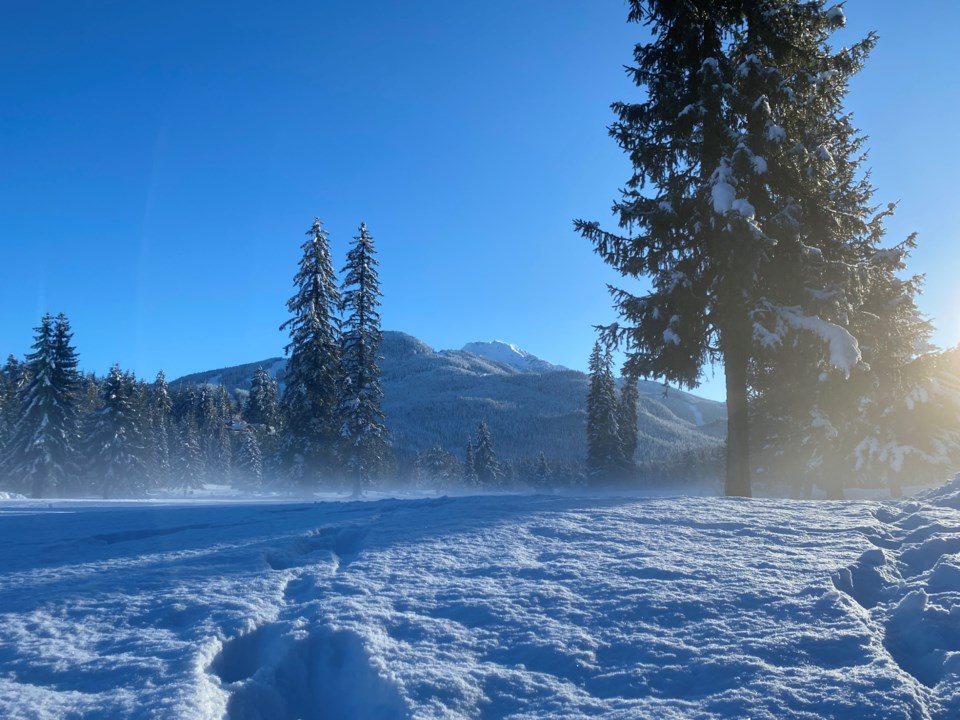As far as Christmases go, Whistler’s was more wet than white in 2023.
But ski areas across B.C. are breathing a major sigh of relief this week after some long-overdue winter storms finally delivered the goods, and tourism’s outlook for 2024 is just a little brighter than it otherwise might have been.
B.C.’s tourism operators are a bullish bunch—they know their industry is at the mercy of Mother Nature, and in 2023 the weather played a larger role than ever in the province’s tourism outcomes.
Whether it was wildfires blanketing the province, landslides closing major highways, or El Niño conditions softening the start of ski season, tourism had its work cut out for it last year.
“By and large, though, 2023 was a good year for many tourism businesses, but still not perhaps in the state we were prior to the pandemic,” said Walt Judas, CEO of the Tourism Industry Association of BC.
“So there’s optimism in 2024, to be sure … we will not be at 2019 levels, but slowly inching our way there.”
Dealing with unpredictable weather is one thing, but B.C.’s tourism operators also have to contend with public perception, Judas noted—often an uphill battle in the age of social media and instant word-of-mouth.
So while the snow has now arrived, weeks of unfavourable headlines about bare ski runs and climate change did operators no favours.
“There’s always concern when you see that kind of press, because it’s oftentimes misguided, or it’s overstated,” Judas said. “Now, when you see bare patches at the bottom of lifts and so on, there’s no denying that, but it takes away from where there is good skiing in a place like Whistler, for example, in the higher alpine, or in many resorts around British Columbia.”
Anecdotally, at least, Whistler’s poor Christmas weather didn’t dampen busyness in the resort.
Restaurants were booked, shops were browsed, and spirits remained high given the circumstances (again, anecdotally—your mileage may vary).
And with the snow now arriving in earnest, long lift lineups are once again a common sight in the resort—for better or for worse, depending on your outlook (but why not both?).
Adverse weather seen in recent years like wildfires, flooding, and a lack of snow are of course cause for concern, but “at the same time, if you look back over the last 10 to 20 years, you will see a consistent pattern of there is the odd year where the snowpack isn’t what it once was or needs to be, or what people might expect or what would be considered optimal,” Judas said.
“So I think, yes, there are consistent and long-term impacts of climate change, but we also have to recognize we’re going to have years of El Niño and other years where you’ll have a larger-than-normal snowpack.”
The long-term weather and snow-condition outlook is just one piece of the equation. B.C.’s tourism industry also has to contend with the same cost-of-living, housing, and labour concerns plaguing other sectors of the economy.
Not to mention issues with insurance coverage, land-use and tenures, and the lingering impacts and debt of the COVID-19 pandemic.
On that last point, pandemic grants issued through the Canada Emergency Business Account are now coming due, throwing yet another wrench in the gears for many operators.
“Some of them will look at the prospects this year and say it’s not worth it for me to keep this going. If you look at the restaurant sector, by way of example, which is a significant part of tourism, about one third of restaurants aren’t making money, and half are barely breaking even,” Judas said.
“So those are COVID hangovers, to be sure, and it will be some years for those businesses that hang on before they return to normal, and a healthy profit margin, and are able to reinvest in their business, or generate a profit that they can save for the future.”
So the challenges are many, and 2024 will no doubt have its own curveballs to toss in the mix—but the message is one of optimism as a new year gets underway.
“When I speak with different business owners, I usually hear about the challenges first, but I also hear optimism, because we’ve gotten through very difficult times before—as I say, this is a very resilient industry, and COVID was the lowest point for most business operators for decades, but we have seen notable improvement since 2022,” Judas said.
“Any time there’s the turn of a new year, people are pretty optimistic that it will be better than last year. It may not be spectacular or superb, but it will be very good, and so that’s, I think, the nature of our industry, is we’re very optimistic as a sector, and continue to be, and we’ll deal with the challenges or try to become more resilient as we go.”




